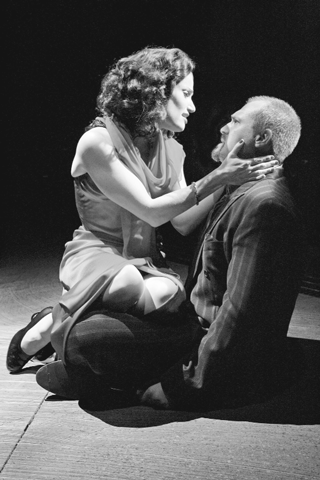Toe-tapping truth at Michael John LaChiusa’s new musical at Public Theater
I heard something most unusual as I left Michael John LaChiusa’s stunning new musical, “See What I Wanna See” at the Public recently. People were actually humming snatches of the songs. Had this been “Spamalot” or “Jersey Boys,” I would have expected it. Heck, audience members sing along at both those shows. But LaChiusa? Whose complex harmonies and unconventional song structure seem intentionally designed to defy toe-tapping? Yep.
LaChiusa has written his most accessible, lyrical score to date, and he has done so without sacrificing the rich humanity and drama of such works as “The Wild Party” and “Marie Christine.” I was an unabashed fan of both those shows, and have long thought that LaChiusa’s gifts are as much in crafting theater as music. “See What I Wanna See” succeeds on both counts.
LaChiusa has chosen for his subject matter truth and the nature of experience. The show is essentially three short stories set to music based on the work of Japanese writer Ryonosuke Akutagawa. In all three, the perspective shifts so we see that truth, in fact, is never absolute. Facts are facts, but truth is not so easy to discern. The tale of Kesa and Morito, set in medieval Japan, opens each act. It is a story of a woman and her lover that ends in murder, but who is murdered, and why? It depends on how you look at it. The first of the longer pieces, ironically titled, “R Shomon,” is a noir 1950s detective thriller that tells violent tale of a murder in a Brooklyn park. We see the crime through the eyes of the various people involved, each giving a different “truth” to the experience. The second act piece, “Gloryday,” set in Central Park just after 9/11, adds a spiritual dimension to the “Just the facts, Ma’am,” mystery, and explores the nature of God and faith—or the lack thereof—in the search for truth.
Ultimately, LaChiusa argues, that while the literal truth may be unknowable, it is the search that gives life meaning. It is a particularly compelling message for our time when too often rigidity and righteousness attempt to crush logic, to try to control a story and call it truth. It is easy to go through life seeing only what one wants to see, but it is also inaccurate. Addressing human ignorance and insignificance engendered the work of the existentialists. It’s frightening, but no nearly as much as the alternative––a culture so insistent on certainties that it vilifies inquiring hearts and minds. How do we live with this?
One way is to insist that truth is the story we tell, honestly embracing the uncertainty and hope, without guarantee, that someday we may understand. That is faith in its most genuine form, and it gives LaChiusa’s piece the most bittersweet—and real—happy ending of any musical of my memory.
Director Ted Sperling demonstrates ample talent with this piece. What appears on the stage for all the intellectual complexity is remarkably entertaining and emotionally compelling. He has assembled a powerhouse cast that includes spectacular performances from each of the actors. Marc Kudisch, as always, is extraordinary. As Morito, the Husband in the first piece, and most startlingly as an accountant who has given up the trappings of his life on a spiritual quest that is revealed as probably corrupt, Kudisch adapts his powerful baritone and focused acting to the small theater. Idina Menzel, also in several roles, is powerful. Both Henry Stram and Aaron Lohr inhabit their several roles beautifully. Stram in particular is gently moving as a priest who regains his faith.
Yet among all this talent, it is Mary Testa who, once again, delivers a spellbinding performance. A versatile actress, a powerful singer, Testa can roll you in the aisles or break your heart by simply raising an eyebrow, though happily she does so much more. In two pivotal roles—a matter-of-fact medium in the first long piece and a prickly dying woman who has lost her faith in the second—her characters become central to work’s intellectual mission while being completely believable as people.
Together, this piece and this company have created something marvelous and rare. So we walk out humming and thinking the truth is unknowable. Given this level of artistry and intelligence, not only can I live with that, I know that this is the kind of musical theater I wanna see—again and again.
Charles Fuller’s “A Soldier’s Play,” now at Second Stage, suffers from a long expository first act, undeveloped and predictable characters, and a detective story structure that wears thin from its familiarity. When this production, directed with no special flair by Jo Bonney, finally comes alive in the second act, the dynamic performances by the talented company almost make up for the material’s shortcomings. By that time, however, the pyrotechnics feel forced, and the self-conscious story of race relations and murder in the military during World War II seems contrived. What wants to be a noble story about the defeat of discrimination and the vindication of the innocent needs more in terms of character and dramatic tension to be fully satisfying theater.
Taye Diggs gives a fine performance, however, as Captain Richard Davenport, the lawyer brought into Fort Neal to solve the murder of an unpopular captain. He is a charming actor who in this case, however, is hampered by a script that makes him more a plot device than a human being. Also good are James McDaniel, Royce Johnson, Anthony Mackie, and Mike Colter, but they, too, all play relatively stock characters who are more pawns in the playwright’s game than people we can care about. When the play is built on so many distant devices, one desires something more.
gaycitynews.com


































